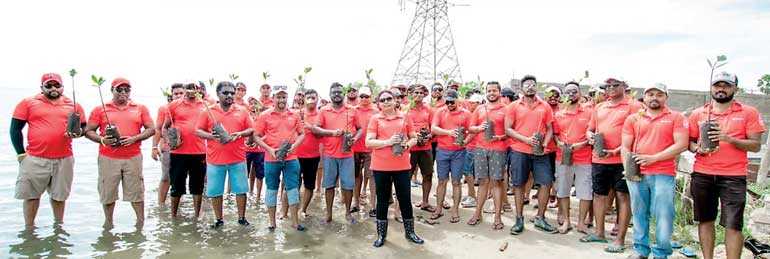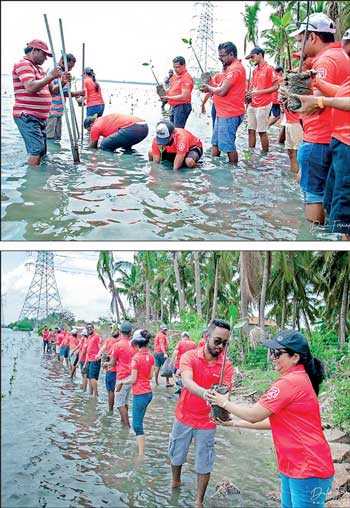Wednesday Feb 18, 2026
Wednesday Feb 18, 2026
Wednesday, 23 October 2019 01:49 - - {{hitsCtrl.values.hits}}

Kalpitiya is home to traditional fishing families who live on the border of the Puttalam lagoon. The lagoon, one of the largest estuaries of Sri Lanka is rich in coastal resources especially mangroves which is one of the most extensive in Sri Lanka.
The population in the area is dependent on the natural resources, using mangrove wood for their use. However they are unaware of the value of this natural resource and the impact of damages caused to the mangrove system.
This natural ecosystem has been subject to heavy habitat destruction due to various reasons, where vast areas of mangroves have been cleared for development activities such as shrimp farms and tourist infrastructure.
Mangroves are one of the most biologically important and productive ecosystems of the world. Mangroves serve many purposes such as, breeding grounds for fish and other marine species, nesting grounds for local and migratory birds, facilitates the growth of corals, shelter for coral species at risk of extinction from coral bleaching, food and livelihood for local communities. However the most important is the key role mangroves play to mitigate climate change, as they sequester up to 50 times more carbon than other ecosystems.
Selecting this as their Employee Volunteerism project for 2019, over 100 volunteers from the bank’s Shared Services, Treasury and Privilege Select Banking Departments restored 3,400 mangrove plants covering one hectare in Kalpitiya.

The Team partnered with the Small Fishers Federation of Sri Lanka (SUDEESA), a local NGO who has been in the forefront of restoring mangrove forests, together with Government authorities and international entities.
The NDB Team also united with the fishing community in the area, engaging them in the project and making them partners of the project. With the assistance of SUDESSA, the community was made aware of the importance of mangrove forests and the need to sustain them. SUDESSA has expertise knowledge/experience in this field with a methodical structure and procedure in place which would ensure the sustainability of the project.
The team of NDB volunteers worked tirelessly for over two months to plant the mangroves, together with the villagers as well as the children. A lot of effort went in to the project from the NDB team as well as SUDESSA and the community. The team ensured that the community was part of the project in order to ensure long-term sustenance of the project. Therefore, the community was educated and engaged to care for the plants during the first three years, where the plants have to be monitored carefully and plants replaced if required.
The long-term impact of this project is immeasurable to the environment. It also directly benefits over 1,500 individuals in the area who are small scale fisher folk and farmers. The NDB team ended the day by distributing dry rations to the families as well as a valuable stationary pack to the children.
As a responsible corporate citizen, employee volunteerism is a key CSR initiative in the bank’s CSR agenda.